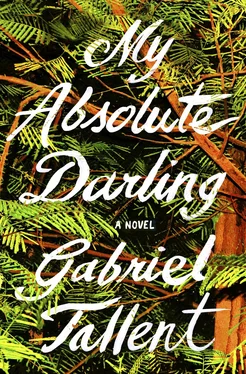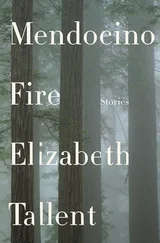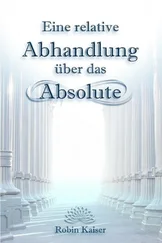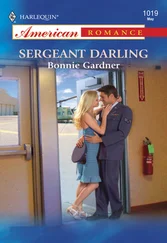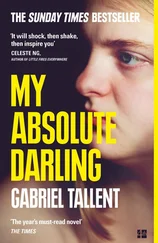“Is that what your name means?”
“Is this a koan? Can you help us? To which the reply is, and can only ever be: silence.”
“Dark, dude.”
Turtle is surprised that they would go on like this in a cold downpour and then she thinks, they’re waiting on you, Turtle. They’re waiting on you and the talking helps them. “This way,” she says, and leads them back into the forest.
In the dark, she circles the largest trees, Jacob shining his light on them. She leaves the boys huddled together and ventures out in every direction, cutting back to them when she doesn’t find what she’s looking for. She is hoping for a burned-out redwood with a hollow chamber, but the best she finds is a stump, crosscut long ago, with axe-cut notches in the sides where the scaffold was pegged to the trunk.
She looks up at the stump’s hidden crown and Jacob watches her, shading his eyes from the rain, and then follows her gaze. Lightning strikes on Albion Ridge across the river, and Turtle counts it, two miles before the thunder comes, rolling with the distance.
She climbs up the bark, hooks the top with a long reach, and drops into a deep, circular pit where the heartwood has rotted out. The hollow crown is ten feet across and tall enough to sit in without being able to see over the sides. A single huckleberry grows up through the middle in a rough circle of punky wood that drains the water. She wraps her fist around its base and rips it out and pitches it into the dark. She helps Brett and Jacob up, and they begin digging out leaf litter. She opens Brett’s backpack, finds a hundred feet of parachute cord still in its tight store-bought bundle, teases the bundle apart, quarters the line, and passes her knife through the loops to make four twenty-five-foot lengths.
They unfold the blue tarp and Turtle bowlines the parachute cord to the corner grommets. Then she drops off the stump, and Jacob after her, while Brett holds the tarp. She pitches Brett a center pole, and he holds it in place. She wraps the first line around a stob, passes the bitter end back to the standing line, and ties a tautline hitch, a slide-and-grip knot that can be cinched up the wet line, though she wonders, even as she is tying it, if a tarbuck knot would be better. She guys out each line in turn. When she comes to the last, she finds that Jacob has already guyed it out and tied the tautline hitch. Water runs down the line, gathers just above the knot, and streams off in a single ribbon. The blue light from the headlamp follows the water on the parachute cord. She runs the knot between thumb and forefinger, finds it tight and well dressed. Jacob stands beside her.
She says, “You knew this knot already?”
“No,” he says, “just saw you make it.”
She plucks the line, and it thrums. She looks at him but doesn’t know what to say, because he’d made the knot well, in the dark, not knowing how to make it, and she thinks he should be told how good that is, how rare, but she doesn’t know how to say such a thing. She undoes Jacob’s knot, then makes the next knot with conspicuous slowness. She ties a slipknot high on the standing line. She takes the bitter end, which passes around a branch, and brings it through the slipknot and bends it back down, making a pulley. She hauls on the line until the cord cuts paling corrugations across her palms. The pulley tightens the whole system; the tarp creaks with strain. She looks at him again.
Rain runs down his face, and he wipes his eyes, nodding.
She ties the tension off with half hitches, making them with exaggerated slowness. She glances back at him again, and plucks the cord.
“Ahh,” he says.
“The rain,” she says, “loosens the lines.”
He nods again.
Here is the difference between me and Martin, she thinks, here is the difference—it is that I know the rain loosens the lines and I care, and Martin knows that the rain loosens the lines and he does not care, and I do not know why, I do not understand how you could not care, because it is important to do things right, and if that isn’t true, I don’t know what is.
She circles the stump, testing each guyline, cinching them down and doubling them up with half hitches, thinking, goddamn Martin, and how I will pay for this, how I will get down on my knees and beg not to pay and how I will pay anyway.
“It’s like she can see in the dark,” Brett says.
“She can,” Jacob says. “You can tell she can.”
“No, like she can really see in the dark . And not just a little.”
“Yeah,” Jacob says. “That’s what I mean.”
“Where do you think she is right now?”
“In her head,” Jacob says.
“I can hear you,” Turtle says. She climbs up the side of the stump and helps Jacob after her.
“She’s so quiet.”
“Not all of us,” Jacob says, “go through life in a caffeine-fueled rage, Brett.”
“Hey,” Brett says, “it’s good for your stomach. The coffee burns the ulcers right off your stomach lining.”
“What are you talking about?” Turtle says.
“Coffee,” Jacob says, “and how it mineralizes your bones.”
“Is that true?”
“No,” Jacob says.
Inside, they have made a kind of dark, wet grotto, ten feet across, maybe four feet deep. Brett has laid down a heavy-duty plastic ground cloth, and now he hunches at the far end of the grotto, huddled up in his sleeping bag, his arms wrapped around himself, shivering. Jacob is unpacking his bag. He takes out a siliconized nylon stuff sack and offers it to her.
“What?” she says.
“Take my sleeping bag.”
“No way.”
“You’re shivering.”
“So are you,” she says.
“I’m going to spoon Brett,” he says.
Brett says, “What?”
“Take the bag,” Jacob says.
“No,” she says.
“First of all, we owe you,” Jacob says. “We never would’ve found somewhere dry if not for you. Second of all, Marcus Aurelius says—”
Brett groans. “If only,” he says, “the emperor’s journal had been burned, as he asked. Should we really follow the instructions of a man whose final instruction was that his former instructions be destroyed?”
“Marcus Aurelius says,” Jacob continues, “that ‘joy for humans lies in human actions: kindness to others, contempt of the senses, the interrogation of appearances, observation of nature and of events in nature.’ This—loaning you my bag—satisfies all of those conditions. Please take it.”
Turtle is looking at him, incredulous.
“What’s happening?” Brett says.
“I don’t know,” Jacob says. “Maybe she’s making an expression?”
“What?” Turtle says.
“Please, let me give you the bag.”
“No.”
Brett says, “Turtle, take the bag. Seriously. His grasp of reality is tenuous at best, so arguing with him is dangerous. Nobody knows what will shake off that last handhold and send him spiraling into madness. Also, I have a sleeping bag that we can sort of spread out like a blanket.”
Turtle looks from one to the other of the boys, and tentatively accepts the sleeping bag and begins pulling it out of its sack. The nylon is of such a high grade that it is soft as silk. It is homemade and has no zipper. She slips into it. The rain drums on the plastic ceiling, filling the chamber with noise. She can feel her breath in moist plumes, and she runs her cold hands together, the fingertips turned to raisins. She can hear the boys in the dark, their ragged exhalations, their movements as they huddle close under the one sleeping bag.
Brett says, “Jacob?”
“Yeah?”
“Jacob, do you think she’s a ninja?”
She says, “I’m not a ninja.”
Brett says, “She’s a ninja, isn’t she, Jacob?”
Читать дальше
Конец ознакомительного отрывка
Купить книгу
